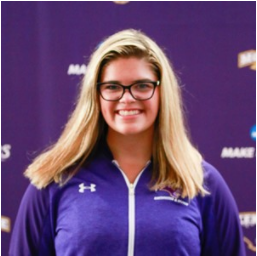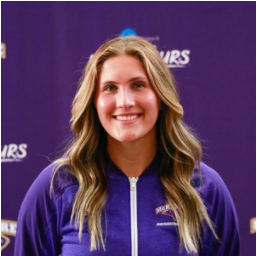
By Haley Rey, Editor in Chief
Photos from McKendree University
McKendree’s Swim and Dive Team, established in 2016, practices between 18 and 20 hours a week. There are two-hour swim practices each week day afternoon and on Monday, Wednesday, and Saturday mornings, and one-hour weights sessions on Tuesday and Thursday mornings.
The team practices in the McKendree MetroRecPlex (aside from weights sessions), which was built in 2017. In case you’ve never been in a college competition pool, it is 25 yards long, and the RecPlex’s pool has 10 lanes. At the bottom of each lane is a black line that spans the length of the pool. Swimmers stare at this black line—or at the ceiling, during backstroke—for 16 hours a week.
A few years ago, a friend asked me what I thought about for two straight hours with nothing to look at but the practice sheet, my teammates and coaches, and the black line. I had no solid answer for them at the time. I recently decided to ask a few of my teammates this question…
At first, I focused on which techniques the team actively thinks about when in the water.

Senior Hallie Dixon shared, “I actively think about my entry and distance per stroke. I have had a problem with swinging my arm before entry, so I have to think about it to correct and prevent this behavior. When I am doing hard sets, if I count my strokes, it helps me lengthen my stroke and be more efficient in the water.”
Freshman Caitlyn Sligh thinks about different techniques for each stroke: “Since I’ve had a lot of injuries with my shoulder and back, I really focus on using my lats more instead of just my shoulders when I’m swimming freestyle, along with always activating my abs and core for every stroke. On top of that—for freestyle—I try to reach further. For backstroke, I think about keeping my hands outside of my shoulder in the “Y” position. For butterfly, I think about pushing my head forward instead of down. For breaststroke, I think about keeping my arms up and shooting them forward.”
Hope Euler, a sophomore, focuses a lot on her best stroke. She explained, “During swim practice, I normally think about my stroke length and getting my arms fully extended during freestyle. I also focus on setting my catch for freestyle, thinking about how much water I’m pulling.”
Another senior, Noah Javens, also thinks about his technique, saying, “I almost always count my strokes and underwater kicks when I’m practicing.” Sometimes the best way to improve each day is to keep the little things in mind.

Next, I asked how the team stays motivated when testing their limits, like during pace sets. When we try to benchmark, it can be tough to finish what we started.
“I motivate myself by supporting my teammates and remembering why I am doing each set. For me, it is easier to do a hard set if I have teammates cheering me on and supporting me, so I try to be that person for others,” shares Dixon. “The mutual support reminds me that we are all getting through it together. Additionally, I think about why I am trying to hit my paces and about what my end goal is; I have made it to Nationals before, so I know what I need to do to get back to that level.”
Hallie is not the only one that stays motivated through the support of her team. Euler also shared, “I motivate myself by trying to pace myself with my teammates next to me. Having that competitive atmosphere really makes me want to push myself to be better.”
Sometimes, the mindset needs to come from your end goal, when you know you’ll feel the best about the work you’ve put in. Javens told me, “I’m able to keep pushing myself at practices by reminding myself of the pride I’ll feel afterwards.”
This was true for Sligh, as well. “Usually, I yell at myself, ‘let’s go, let’s go!’ because back home, that’s what my coach would always yell at us to fire us up,” she shared. “But on top of that, I just remind myself over and over that I need to push now to get the results I want in the end (i.e., drop time).”
Other times, motivation comes purely from energy level. Ana Radulovic, a freshman, explained, “My motivation in training often depends on my mood, especially if it is an afternoon practice when I’m already tired from classes and my day before training, so I usually have better concentration in morning practices, even though I’m sleepy.”

Jumping off of this thought, I was also curious how an athlete’s thoughts may change depending on the time of day the practice is held. It makes sense that the way one thinks when swimming at 6:00 in the morning is different from how they think when swimming at 3:00 in the afternoon.
Euler responded, ““I find that I have better practices later in the afternoon; I feel more motivated then.” After all, sometimes the goal when you’re working out in a cold pool that early in the day is to just get through it!
As far as fun, casual thoughts that occur during practices, one common way to pass the time while swimming is to sing to yourself.
“Probably the most common question for swimmers is what is on our minds while swimming. Singing in our head is certainly one of those things. I often sing songs in my language, but there are also some in English,” tells Radulovic. “I hate it the most when I only have one or two verses of a song in my head, and it’s constantly spinning but I can’t get them out of my head. The type of music usually depends on the mood.”
Sligh also stays entertained by music while swimming. She explained, “Oh my goodness, I have like a million songs I sing during swim. If I’m swimming, I’m usually jamming out, especially because we have music playing during each practice, so I’m usually singing the rest of the song under water!”
Euler does this as well. She told me, “Whatever song Coach Nathan is playing, I sing to myself in my head.”

Finally, I asked upperclassmen how their thoughts change during Winter Training, and whether they use the feeling of success and payoff at Conference and Nationals to keep moving forward. Winter Training takes place in December and January, when most of the students on campus have gone home. For our break, we usually have between 10 and 15 days off, during which we’re expected to keep up with workouts on our own time.
“Winter training is a difficult time, but I get through it with the support of my teammates. I often set mini goals or rewards (eating out, movie nights, etc.), which helps me push through the week to get to that point,” said Dixon. “It’s an interesting time to be on campus, too, because there is not much to do, but we make the most of it and bond more as a team. Reminding myself of how the payoff feels helps a lot, too. Seeing the time drops at Conference and Nationals makes all the hard training worth it! When I look up at the clock and see my time, it feels amazing to know what my body can do.”

Javens also chimed in, saying, “I’m able to get through Winter Training because it’s my favorite time of the year; I swim, eat, play video games, and nap whenever I need to.”
Clearly, there is a good amount of payoff that swimmers experience in the competition season, which helps to motivate them for the next year. It’s easier to keep moving when you’re chasing the feeling of accomplishment. Hallie Dixon told me about how her mental game helped her succeed in many of her recent goals.
“This past year, I experienced three big time drops in three consecutive meets in one of my events, the 400 IM,” she said. “It was a great feeling to see that my hard work was paying off and even better to feel the love and support from my teammates and coaches. At Nationals, I went a best time by four seconds, which I would have never guessed beforehand. I remember walking over to my coaches, feeling overwhelmed with joy. Then we realized that I had made it into the top eight, and it made all the training and meets from the past three years worth it.”
Athletic mental game is an extremely important factor. It’s a good idea to reflect on what you really think about during your practice time, and try to shape it to help guide you in your sport!